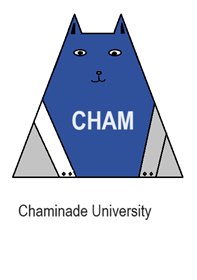"Is your college or university looking to support a truly great initiative? Continued awareness is the key to long-term success of this national initiative. A student project-based learning initiative allowing your students to submit RFP's, earn income, and work w/businesses."
|
|



| Term | Course Title/Number | Register NLT Date | Location | Textbook | Fee |
| Open | IT Professional Apprenticeship/CP-ITAC2025-1 | 3/5/2025 | Virtual | Unleashing Your Harnessed Potential | $289 |



| Term | Course Title/Number | Register NLT Date | Location | Textbook | Fee |
| Open | IT Professional Apprenticeship/CP-ITAC2025-1 | 3/5/2025 | Virtual | Unleashing Your Harnessed Potential | $289 |



| Term | Course Title/Number | Register NLT Date | Location | Textbook | Fee |
| Open | IT Professional Apprenticeship/CP-ITAC2025-1 | 3/5/2025 | Virtual | Unleashing Your Harnessed Potential | $289 |
|
Term Of The Day: FOMO FOMO is an acronym for Fear Of Missing Out, which is a feeling of envy or anxiety over missing out or being out of touch with events, experiences, or interactions. The phrase-turned-acronym has become so widely used and popular that Oxford and Merriam-Webster added it to their dictionaries as an officially defined word. WHAT IS FOMO? While originating from the fear of missing out, the term has taken on additional connotations. FOMO is the fear of not being included in an exciting or enjoyable activity or event that others are experiencing and sharing. People often don’t want to feel as if opportunities or events pass them by in life. Patrick McGinnis first created the term in 2004, in which FOMO became a term that has taken greater cultural precedence with the rise of social media. The psychological problem with FOMO is it can increase a person’s stress and anxiety while also negatively impacting a person’s self-esteem. If a person perceives that they are missing out on opportunities, events, or things, they may see a negative impact on their mental health and self-esteem, believing others are experiencing more joy in their lives. Those experiencing the phenomenon don’t know what they’re missing most of the time, but they worry others are having fun without them. This feeling of missing out on something has been around for centuries but wasn’t formally identified until 1996 by a marketing strategist. |
A: There are four levels of apprenticeships: intermediate, advanced, higher, and degree.
A: An apprenticeship gives you hands-on experience, a salary and the opportunity to train while you work as an apprentice.
A: The short answer to that question is no, not if you put the effort in; you don't necessarily have to jump through hoops to become an apprentice. In fact, some don't require any prior qualifications.
A: 26 of the top 100 most applied for apprenticeships were in accountancy. 22 were across IT, software, digital and digital marketing roles.
A: As an apprentice, you will be paid for time spent training or studying for your apprenticeship. This means that Apprentices must spend at least 20% of their normal working hours training. The training can take place: at their place of work.
A: You can start an apprenticeship at any level. Depending on the level, some apprenticeships may: require previous qualifications such as an English or maths GCSE. give extra training in the English or maths skills needed so you're at the right level.
A: Low Pay. Apprentices typically receive significantly lower pay than certified or professional workers, despite often sharing in the same basic projects and tasks
Minimal Recognition
Work Limitations
A: Apprentices can start work as young as 16 and apprenticeships are generally for a minimum of 30 hours per week. The Working Time Regulations 1998 state that young workers should not work more than eight hours a day and 40 hours a week and don't normally work at night.F
A: 19 to 24-year-olds account for 30.5% (106,300). Apprentices aged 25 and over account for 47.4% (165,300).
A: Apprentices who fail one or more assessment method will be offered the opportunity to take a resit or a retake.
| Skillset-2-Job Role Compatibility | Work Experience Builders | by CertificationPoint |
|---|---|---|
| Scripting (Bash, PowerShell) | Python | Cybersecurity Controls and frameworks |
| Intrusion detection | Security information and event management | Network security control |
| Operating systems | Incident response | digital forensics and malware analysis |
| cloud security | development and operations (DevOps) | Threat knowledge |
| Open Web Application Security | Cyber Threat Intelligence | General Data Protection Regulation |
| Health Insurance Portability and Accountability Act (HIPPA) | cybersecurity workplace skills | cybersecurity analyst |
| communicate technical concepts | Collaboration | Risk management |
| Build foundational knowledge | risk management | Adaptability |
| Critical thinking | SQL (Structured Query Language) | create, manipulate, and query databases |
| SQL and relational database skills | database management professional | Enterprise Data Warehouse Management |
| CRM/Automation System | Unix Shell Scripting | Project Management |
| ETL (Extract, Transform, Load) | Data movement and manipulation | Data Modelling |
| Backup and Recovery | Development Tools | integrated development environments (IDEs) |
| Web Technologies | Data Security | Capacity Planning |
| ERP (Enterprise Resource Planning) | Frameworks Knowledge | Network Administration |
| Information Technology | Firewalls | Windows Server |
| Microsoft Windows | LAN | Firewalls |
| Troubleshooting | Active Directory | WAN |
| Computer Science | Communication Skills | Virtualization |
| Network Security | VPN | Customer Service |
| VMware | DHCP | Help Desk Support |
| Linux | Documentation | Aerospace Engineering |
| Architectural Engineering | Automotive Engineering | Biomedical Engineering |
| Biotechnology & Bioinformatics | Chemical Engineering | Civil Engineering |
| Computer Engineering | Cyber Security | Electrical Engineering |
| Robotics | Software Engineering | Structural Engineering |
| Transportation Engineering | Entrepreneurship | eBusiness |
| Healthcare Management | Business Analytics | Business Management |
| Construction Management | Science & Technology Management | Sports Management |
| Accounting | Hotel Management | Human Resource Management |
| International Business | Labor Relations | Logistics & Supply Chain Mgmt |
| Management Information Systems | Marketing | Social Work |
| Statistics | Surveying | Urban Planning |
| Veterinary Science | Supply Chain Management | Inventory Management |
| Warehouse Operations | Transportation | Procurement |
| Distribution | Freight Forwarding | ERP Systems |
| Customs Compliance | Demand Planning | Problem Solving |
| Teamwork | Leadership | Organizational |
| Communication | Adaptability | Time Management |
| Attention to Detail | Decision Making | Critical Thinking |
| Negotiation | Crisis management skills | Forecasting skills |
| Supervision skills | Robotics skills | Office skills |
| Microsoft office skills | Hospitality skills | Automation skills |
| Integration skills | Mathematics skills | Visual Art skills |
| Public Speaking skills | Senior Scrum Master | Sales Director |
| Translator | Volunteer | Creative |
| Modern Mgt | Python | Java |
| Javascript | Git | SQL |
| HTML | MySQL | CSS |
| C++ | Autocad | AWS |
| Matlab | Jira | Linux |
| Docker | Jenkins | C |
| C# | PHP | Mongodb |
| Microsoft Office | React | Bootstrap |
| Agile | jQuery | Teamwork |
| Problem solving | Angular | Typescript |
| Vendor management skills | SAP skills | Collaborative skills |
| Spark skills | People management skills | Maya skills |
| Performance management skills | Remote Work Skills skills | Purchasing skills |
| Active directory skills | Automation skills | Quality management skills |
| Data modeling & engineering | Big data analysis | AI and ML services |
| AI Deployment & DevOps | AI security | Adaptability and continuous learning |
| Critical thinking and problem-solving | Neural network architectures | Visual Storytelling with Data |
| Distributed computing dynamics | Content Writing | AI Prompting |
| Web Coding | Financial and economic data | Strategic planning |
| Performance monitoring | Staff management | Customer trend analysis |
| Linux Fedora Core 9 | Organization | Multitasking |
| Strategic planning | Goal setting | Strategy development |
| Operations management | Project management | Process optimization |
| Financial administration | Data analysis and reporting | Quality control |
| Marketing and sales | Resource planning | Performance monitoring |
| Staff management | Relationship building | Trend analysis |
| Information systems and database knowledge | MS Office Suite | Zoho One |
| QuickBooks | Trello | Leadership |
| Organization | Multitasking | Problem-solving |
| Verbal and written communication | Time management | Task prioritization |
| AutoCAD | SolidWorks | CATIA |
| Revit | ANSYS | 3D Modeling |
| Blueprint Reading | SketchUp | MathCAD |
| Drafting | Photoshop skills | Cloud skills |
| Data management skills | Teamwork skills | Strong Work Ethic skills |
| Payroll skills | Relationship Management skills | Lean skills |
| C++ skills | Cms skills | Public Speaking skills |
| Persuasion skills | Data analysis and visualization skills | Development and programming skills |
| Project and process management skills | Design and multimedia skills | Digital marketing and content management skills |
| Cloud and IT infrastructure skills | Emerging technology skills | Digital marketing tools (e.g., Google Analytics, SEO) |
| Social media management platforms (e.g., Hootsuite, Buffer) | Content management systems (e.g., WordPress, Drupal) | Graphic design software (e.g., Adobe Photoshop, Canva) |
| Email marketing platforms (e.g., Mailchimp, Constant Contact) | Spreadsheet software (e.g., Microsoft Excel, Google Sheets) | Financial analysis and modeling tools (e.g. Quantrix, Scenario) |
| Accounting software (e.g., QuickBooks, SAP) | Data visualization tools (e.g., Tableau, Power BI) | Risk management software( e.g. Vanta) |
| Electronic Medical Record (EMR) systems | Medical billing and coding software | Health information systems |
| Telemedicine platforms | Medical imaging software (e.g., PACS) | Data analysis and research tools in healthcare |
| Learning management systems (e.g., Moodle, Blackboard) | Educational software and tools (e.g. OneNote, PDF Element) | Online collaboration platforms (e.g., Google Classroom) |
| Multimedia authoring tools (e.g. Hypertext, Lectora) | Educational assessment tools (e.g. Mentimeter, Nearpod) | Video editing software (Final Cut Pro, Adobe Premiere Pro) |
| 3D modeling and animation software (Maya, Blender) | Digital photography and photo editing software | Social media management tools |
| Content management systems (WordPress, Drupal) | Video production and editing software | Social media platforms and analytics tools |
| Search engine optimization (SEO) techniques | Data analysis and reporting tools | Event management software (Whova, Eventbrite) |
| Project management tools (Trello, Asana) | Communication and collaboration tools (Zoom, Dropbox) | Data analysis tools (HubSpot, Google Analytics) |
| Computer-Aided Design (CAD) | Building Information Modeling (BMI) | Estimating and costing software (RSMeans) |
| Communication and collaboration tools (PlanRadar, Smartsheet) | Project management software (Construct, ProCore) | Financial analysis software (e.g., Bloomberg Terminal, FactSet) |
| Risk management tools (e.g., Riskalyze, RiskMetrics, and MSCI RiskManager) | Banking software and platforms (e.g., Temenos, Finastra, and FIS) | Data analysis and reporting tools (e.g., Tableau, Power BI, QlikView) |
| Financial modeling and analysis (e.g., Microsoft Excel) | Proficiency in spreadsheet software (e.g., Microsoft Excel or Google Sheets) | Knowledge of procurement software: (e.g., SAP Ariba, Coupa, or Oracle Procurement) |
| e-procurement systems | Data analysis and reporting: (e.g., Tableau) or statistical analysis software (e.g., SPSS) | Communication and collaboration tools: (e.g., Google Meet, Microsoft Teams) |
| Microsoft Office Suite (Word, Excel, PowerPoint, Outlook) | Database management systems | Document management software |
| Calendar and scheduling tools | Virtual meeting and communication platforms | Architectural design software (e.g. AutoCAD, SketchUp, Revit) |
| Building information modeling (BIM) software | Rendering and visualization software (e.g. Vectorworks, Adobe Substance 3D) | Project management tools (e.g. Archicad, Wrike) |
| Energy analysis and sustainability software (e.g.Diligent ESG, Novisto) | Human resources | Human resources information systems |
| Microsoft Office Suite (e.g. Word, Excel, PowerPoint, and Outlook) | Applicant tracking systems (ATS) | Data analysis and reporting (e.g. BI, Python) |
| Collaboration tools (RingCentral, Basecamp) | Manufacturing software (e.g. Fishbowl, Prodsmart) | Data analysis and reporting (e.g. Factbird, Segment) |
| Inventory management (e.g. Katana, Cova) | Quality control software (e.g.Greenlight Guru, KAWAK) | Troubleshooting and maintenance |
| System installation and maintenance | Network administration | Security management |
| Diagnosis and troubleshooting of IT issues | End-user support | Remote support |
| Backup and recovery operations | IT standard compliance | Automated IT systems |
| Helpdesk management | Training and mentoring | Performance optimization |
| Network monitoring and optimization | Documentation and recordkeeping | Time management and problem-solving ability |
| Communication and interpersonal skills | Knowledge of computer hardware, software and peripherals | Knowledge of IT standards and protocols |
| Knowledge of customer service best practices | Backup and Disaster Recovery | Remote Desktop Support |
| Windows 8.1 | Windows 10 | Windows 11 |
| Operating System Installation and Configuration | Chromium OS | Android |
| Linux | Fuchsia | Wear OS |
| OS/360 | z/OS | IBM |
| AIX | OS/2 | Apple macOS |
| Google's Android OS | Microsoft Windows | Apple iOS |
| Linux Operating System | Agile and Scrum methodologies | Machine learning and AI algorithms |
| API design and development | IT compliance and governance | UX/UI design principles |
| Blockchain technology | Containerization technologies (Docker, Kubernetes) | Version control systems (Git, SVN) |
| Software testing and debugging | System architecture design | Performance optimization |
| Storyboarding | Adobe Creative Suite (Illustrator, InDesign, Photoshop) | User interface design |
| User experience design | Augmented reality (AR) design | Virtual reality (VR) design |
| Accessibility standards for design | Prototyping (digital and physical) | Lean Green Belt Training |
| Lean Yellow Belt Training | Web Administrator | Computer Security Management |
| Qualified Trainer | Workstations & Servers | Traditional Servers/Blade Servers |
| Exchange Server | VMWare | RemedyARS |
| HTML | PERL/CGI | Oracle 8i-9i |
| HP OpenView | CiscoWorks 2000 | Sniffer Pro |
| DNS | Linux/Unix | Novell Netware |
| SQL Server | Internet Information Server (IIS) | ASP/ASP.net |
| Sidewinder (Cobra) | Solaris | Legato Networker |
| TCP/IP | PHP4 | XML |
| Microsoft Office | Visual Studio Development | NetIQ |
| Visio 2000 | Photoshop | CSS |
| DHTML | Internet Scanner | Coldfusion |
| SharePoint Portal Server | SharePoint Designer | Macromedia Dreamweaver |
| Quest TOAD (Oracle database interface) | BootStrap | WordPress |
| Joomla | Mobile Apps Development | OSCommerce |
| NotePad++ | ||
| Build Student Readiness Experience Builder | Build Group-Based Experience Builder | Build Volunteer Experience Builder |
| Create Company-Based Experience Builder | Create New Hire Experience Builder | Create Training Experience Builder |